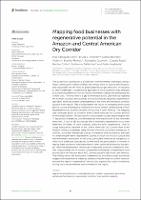| dc.description.abstract | The global food system plays a pivotal role in environmental challenges, being a major contributor to climate change, the primary driver of tropical deforestation, and responsible for one-third of global greenhouse gas emissions. In response to these challenges, a regenerative approach to food businesses has emerged as a promising framework for driving environmental change and addressing the climate crisis. However, there is a gap in information across Latin America regarding the number, location, and activities of food businesses adopting a regenerative approach, hindering a better understanding of this trend and limiting its potential
support in the region. This article presents the results of a mapping effort using specific criteria and analytical frameworks to build a better understanding of how regenerative food business models are evolving in Latin America. The mapping was conducted across six countries in the Central American Dry Corridor and five in the Amazon Biome. The process involved using the Google search engine with 77 keyword combinations, complemented by information from 50 key informant interviews. A total of 181 businesses with a potentially regenerative focus were identified. Of these, 64 were explicitly using the term “regenerative,” with its usage being more prevalent in the Central American Dry Corridor than in the Amazon. Notably, businesses using the term were non-associative enterprises. In contrast, associative enterprises such as cooperatives and associations, although not employing the term “regenerative,” played a critical role in socio-cultural and environmental conservation of territories, particularly when led by indigenous or other local traditional populations. Furthermore, the participation of women in
leading these businesses was higher than in other traditional businesses, though it still reflected global gender imbalances in leadership positions compared to men. This study provides one of the first comprehensive mappings of regenerative food businesses in the Amazon and CADC, offering valuable data from Latin America. The findings reveal the distribution, characteristics, and diverse ways businesses engage with regenerative practices, underscoring the need for further research beyond the explicit “regenerative” term to fully capture the scope of initiatives
driving socio-environmental transformation in the region. | es_ES |


